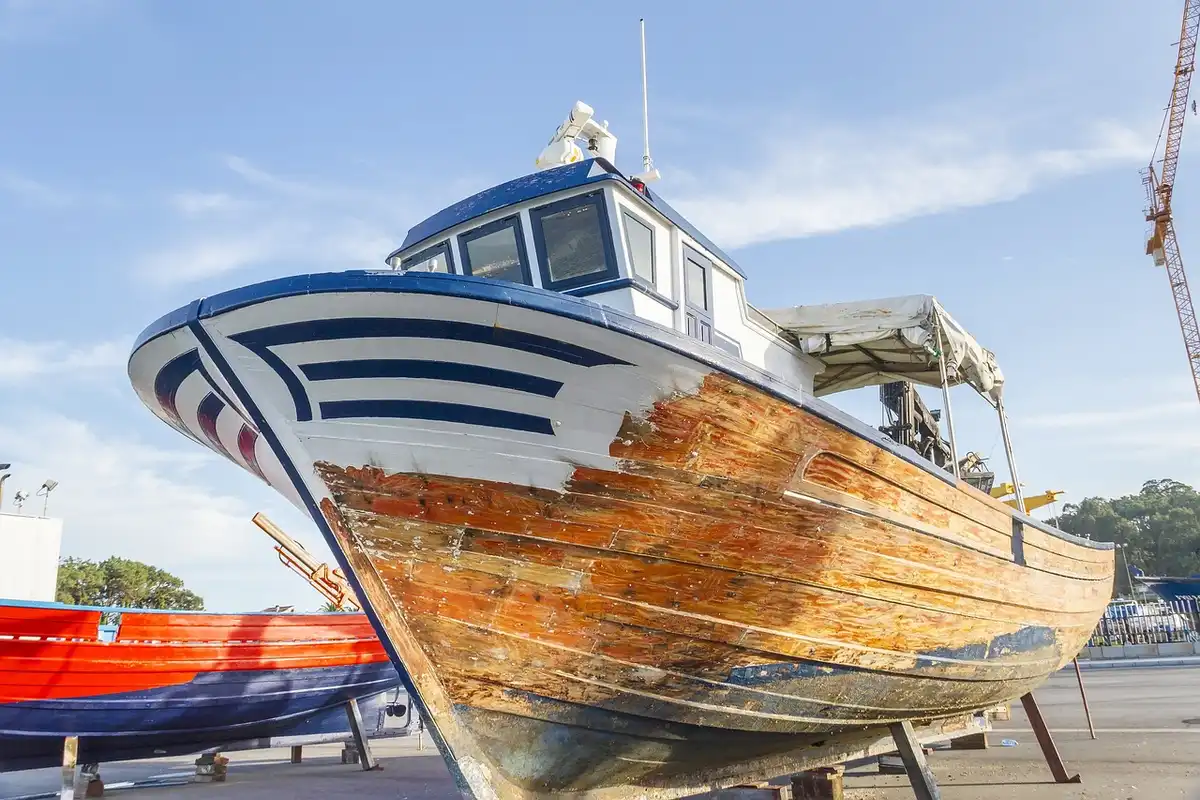
Introduction
As an avid sailor, I know firsthand how important it is to maintain your boat. From regularly checking the hull to keeping up with the latest navigation gadgets, the right maintenance can have a huge impact on the performance and safety of your vessel.
In this article, I’m going to provide a beginner’s guide to boat maintenance. From understanding common boat parts, to knowing which maintenance tasks to focus on first - I’ll be providing advice and tips on how to get the most out of your boat.
In addition, I’ll be sharing a few stories of my own times on the water, illustrating the importance of being prepared and doing the necessary maintenance when you’re cruising on the seas.
So whether you’re a complete novice or a more experienced sailor, I hope you find this guide informative and entertaining, and with any luck it will help you keep your boat running smoothly.
Boat Maintenance
As a passionate sailor, I know that the key to successful sailing is regular and thorough boat maintenance. If a boat’s conditions are not well cared for, it could cost the owner a fortune in anticipated damages that could have been avoided with proper maintenance.
Historical Aspects
Our sailing tradition is based on a long history of sea-faring vessels. Sailors of old were keen about the upkeep and maintenance of their ships to make sure that they can function properly, even in challenging and unexpected conditions.
Social Advantages
Maintenance can also contribute to our social lives. When the boat is running properly and in perfect condition, we can share the fun and joy of sailing with friends, family, or with the sailing community. It can be an exciting daily or weekend activity, an opportunity to create amazing memories, and a moment to meet new sailing friends.
Economic Benefits
Given the substantial cost involved in boat ownership, it is of great benefit for an owner to regularly service and maintain the boat. While regular maintenance can be costly and time-consuming, it can also help to save a boat owner a great deal of money in repairs and unexpected damage costs in the long-run. In addition, when the boat is kept in good condition, we can maximize its potential commercial value if ever we decide to sell it.
Proper and regular boat maintenance is essential to successful sailing. Its historical roots, social benefits, and economic advantages make it a valuable and smart investment that any boat owner should consider. Although it may involve time and cost on our part now, it could save us a great deal in the long-term. Taking care of our boats is more than just a mechanical task; it is a way of making sure that our seaborne adventures are safe, successful, and memorable.
Exterior Maintenance
Cleaning and Polishing the Boat
Taking care of a boat can be a time consuming process. Cleaning and polishing a boat helps maintain the vessel’s aesthetic appeal, promoting a sense of pride in ownership. Start by washing the superstructure and deck of the boat, focusing on removing dirt and debris, before scrubbing the surface to remove stains. Save time and effort by rinsing the surface before using a soft cloth to apply polish or wax. Over time, repeated use of cleaning and polishing can contribute to the overall longevity of the boat.
Checking and Repairing the Hull
Inspection of the hull is an important part of maintaining the boat. Begin by looking for cracks and blisters, irregularities often caused by excessive motors and vibrations as well as inadequate padding or other protective wraps. For boats made of fiberglass, regular waxing also helps prevent water from entering the boat, although repair of cracks or chips may be necessary. Be sure to take note of any dings, dents, and scratches, repairing as soon thereafter as possible to prevent further damage.
Maintaining the Propeller and Drive System
The propeller and drive system is essential to the boat’s propulsion, and thus requires careful and regular maintenance. Over time, dirt and debris can accumulate, leading to a loss of acceleration and power. While inspecting, look for damage such as rust, bent or broken blades, or areas that are gouged — any corrosion and damage should be addressed as soon as possible. As an added precaution, have the propeller and motor inspected (or possibly adjusted) on a periodic basis, particularly if it’s been a while since the drive system has been serviced.
Inspecting and Replacing Electrical Components
Electricity is an essential part of keeping a boat afloat and functioning, so it’s important to inspect and replace the electrical components if needed. When inspecting, look for frayed or corroded wires, and also inspect for broken wires or loose connections. Depending on the size and type of boat, this task could take anywhere from a few minutes to a few hours, and so it is advisable to engage a professional if there are any doubts. Not doing so could lead to potential safety hazards or worse.
I understand and take seriously the importance of maintaining the boat and adhering to a regular schedule of inspections, maintenance and repairs. As someone who has been an avid boat owner for years, I know first-hand that proper upkeep is essential to the life and well-being of the boat and its passengers. I also know that regular cleaning and polishing can extend the life of the boat and has been essential to ensuring that I get to enjoy it for as long as possible.
Interior Maintenance
Cleaning and maintaining the interior
I’ve been onboard boats for almost my entire life and one thing I’ve learned about maintaining them is that it can be a real chore. Keeping the interior clean is especially important, but taking the time to clean and maintain the interior of the boat is what keeps it looking and feeling great.
Checking and Repairing Plumbing and Electrical Systems
The plumbing and electrical systems on boats can get a bit complicated but they’re essential for keeping the boat running smoothly. So, periodically, I check these systems to make sure that everything is working properly. If I find any issues, I’ll do some basic repairs or get help from a professional if necessary.
Properly Storing and Securing Items on Board
It’s important to properly store and secure all items on board to avoid any potential disasters. This includes all equipment, such as lines, anchors, and so on, as well as any items you carry on board with you. I usually use bungee cords to secure items as they have greater flexibility and adjustability.
Maintaining the Boat's Air Conditioning and Heating Systems
The air conditioning and heating systems are a crucial part of boating. Without them, it can become an uncomfortable experience. To ensure that the systems are running smoothly and efficiently, I make sure to clean and check these systems regularly. This includes changing the air filters, changing the oil, and checking the pressure systems.
Overall, keeping the interior of the boat clean and maintained is essential for a pleasant and safe boating experience. I have a lot of experience with this, so I’m confident that I can take care of the job properly.
Engine Maintenance
Checking and Changing the Oil
As a boat enthusiast, one of the most important engine maintenance tasks is to check and change the oil. It’s critical that you check the oil on a regular basis and understand when it needs to be changed. This is especially important if your boat has an inboard/outboard or Stern drive type of engine. It’s the oil that coats and protects various moving parts in the engine, stopping them from grinding together and becoming damaged or dysfunctional. Without regular oil changes, you can easily overwork your engine, which can be expensive to repair.
I remember the first time I checked and changed my boat’s oil. I had read up on it and found that it was actually a fairly simple process. I first checked the levels of oil before removing the old oil. Then I replaced the old oil with new oil and added oil as needed. Finally, I reinstalled the plug snugly, added new oil filter, and topped off the oil reservoir. From then on I made it a point to check and change the oil as soon as I remembered. Doing this ensured that my engine stayed in top condition and didn’t overheat or break down.
Inspecting and Replacing Filters
In addition to changing the oil, boat maintenance involves inspecting and replacing the filters. This means that the oil filter and the fuel filter need to be inspected and changed as needed. It’s important to realize that the oil filter doesn’t just keep the oil clean, but also works to filter out small particles such as dirt and rust, ensuring the engine is as free of impurities as possible. The fuel filter also plays an important role in keeping the fuel system free of impurities.
I’ve found that the best way to know when to inspect and replace the filters is to do it periodically. I usually follow the manufacturer’s recommendation for the interval, which is typically 100 hours or every season. This ensures the engine runs smoothly and the oil stays clean and lubricated. When I do inspect and replace the filters, I make sure I use a quality oil filter and fuel filter for proper filtration.
Maintaining the Boat’s Fuel System
Maintaining the fuel system on your boat is essential to ensure your engine runs properly and safely. This includes regularly inspecting the hoses and checking the fuel tank for any signs of water or debris. You should also check the fuel lines and connections for any leaks. The fuel and vent lines should be checked for their condition, secured and free of any obstructions.
I remember the time I had to inspect my boat’s fuel system. As I went over the lines and connections, I noticed that some of the hoses had come loose and the fuel filter wasn’t doing its job properly. All in all, I had to replace the fuel filter, tighten the connections and replace several fuel hoses. It was a bit of an undertaking, but it was essential for proper engine maintenance. After I finished, I felt confident that I had full control of the fuel system and could rely on it when needed.
Maintaining the Engine’s Cooling System
Just as it is important to maintain your boat’s fuel system, it’s also important to maintain the engine’s cooling system. This includes regularly checking the coolant levels, replacing the impeller as needed, and checking for any leaks. The purpose of the cooling system is to keep the engine from overheating, so it’s important to make sure it’s functioning properly.
One of the best ways to ensure the engine’s cooling system is operating properly is to run the engine with the auxilary impeller removed. I usually do this on a regular basis and take special care to inspect the impeller for any signs of wear or damage. If there’s any evidence of wear, I replace the impeller right away to prevent potential problems. It’s also a good idea to change the coolant every two years, to make sure the engine is running at its peak efficiency.
Taking care of your boat’s engine is essential to ensuring your boat runs safely and reliably. While some tasks such as checking and changing the oil, inspecting and replacing filters, and maintaining the fuel and cooling systems can seem daunting at first, a bit of practice and knowledge can go a long way. After a few tries, you’ll be able to perform these tasks yourself and have the confidence to enjoy time out on the water.
Safety Maintenance
Checking and maintaining boat safety
As a boat owner, nothing is more important to me than having a safe and secure vessel. I take the time to do regular checks and maintenance of the boat’s safety equipment. This includes inspecting and maintaining the boat’s navigation equipment, fire extinguishing system, and ensuring proper ventilation on board.
Checking boat navigation equipment
I inspect the navigation equipment regularly to ensure that all components are functioning properly. This includes checking for proper battery levels and ensuring that all instruments such as GPS, depth finder, and autopilot are in good condition. This helps to avoid any navigational issues on the water.
Maintaining the fire extinguishing system
I check the fire extinguishing system on board to make sure that it is in working order. This includes regularly checking the pressure gauge on the extinguishers, as well as performing visual inspections of all safety equipment. This ensures that I am prepared in the event of a fire on board.
Ensuring proper ventilation on board
I make sure that there is adequate ventilation on board my boat. This helps to prevent mildew and even fires. I also make sure to check the air intakes and air filters to ensure that there is adequate airflow throughout the vessel.
Final thoughts
Making sure that my boat is safe is essential for me as a boater. While it takes a bit of extra work to inspect and maintain the boat’s safety equipment, it’s a small price to pay for being able to enjoy worry-free trips on the water.
Storage and Winterization
Storing the Boat During the Off-Season: Tips and Tricks
As an avid boater, winterizing my boat is something I take seriously. When it’s time to store my favorite vessel for the off-season, I take extra care to ensure it’s well-prepared for the challenge. Here, I’ll share some of my tips for properly storing the boat during the off-season, including preparing the boat for resting, and key steps to take before storing the boat long-term.
Preparing the Boat for Winterization
Before starting the winterizing process, I always fill up the gas and oil tanks, clean the outside and inside of the boat, and remove anything not meant for long-term storage. I wouldn’t want to come back to a moldy onboard toilet next season! As an extra measure, I also make sure to check my radio, navigation lights, and bilge and aerator pumps, as well as any other electronic devices I use while out on the water.
Steps to take Before Storing the Boat Long-term
When I need to store my boat long-term, I take a few extra precautions. I check all the electrical components to see if they need service or repair and bring onboard materials to their off-season requisite levels. This includes draining the water tank, removing cushions for storage, and ensuring everything is disconnected and put away securely.
In addition, I usually get the boat serviced so there are no motor problems when I come back to go on the water. And if I have time before the storing process, I take it out for one more ride. There’s nothing like one last lap of the lake in the fall when the air is starting to cool, the leaves have changed colors, and the lake is at its tranquility.
When I need to store my boat for the off-season, or long-term, I make sure to prepare it properly. This includes cleaning, filling up gas and oil tanks, and checking radio, navigation lights, and bilge and aerator pumps. I also take steps to reduce the chances of mold, such as bringing any onboard materials to their off-season requisite levels, and getting the boat serviced.
Finally, I like to take the boat out for one last ride if I have the chance. Nothing beats that nostalgic last lap of the lake in the autumn months.
Conclusion
Regular boat maintenance is essential for the safe and enjoyable operation of a boat. It ensures your boat will perform optimally on the water and have a longer service life. Neglecting to maintain your boat or performing minimal care can lead to costly repairs down the line or, worse yet, impair the safety of you and your passengers and crew. That’s why it’s very important to prioritize regular boat maintenance and upkeep, and follow the manufacturer’s recommended maintenance schedule.
Regular maintenance, in addition to having a wealth of boat knowledge, is key in helping you ensure safe and enjoyable outings. Oftentimes, I find it helpful to think of boat maintenance as a preventative measure against the unpredictable conditions of the open water. Ensuring your boat is well maintained can help you avoid being stuck out on the water in need of help.
My own experience has taught me the importance of regular boat maintenance and upkeep. I’ve had to call for assistance due to a lack of maintenance on my boat more times than I would like to admit. But I’ve also had moments where a deep cleaning and inspection saved my boat from a serious malfunction.
In conclusion, regular boat maintenance should be taken seriously. It can help keep you and your passengers and crew safe, maximize the boat’s performance, and lengthen its lifespan. Investing in regular maintenance and inspections will not only keep you and others safe, but will also make every boating adventure more enjoyable!

